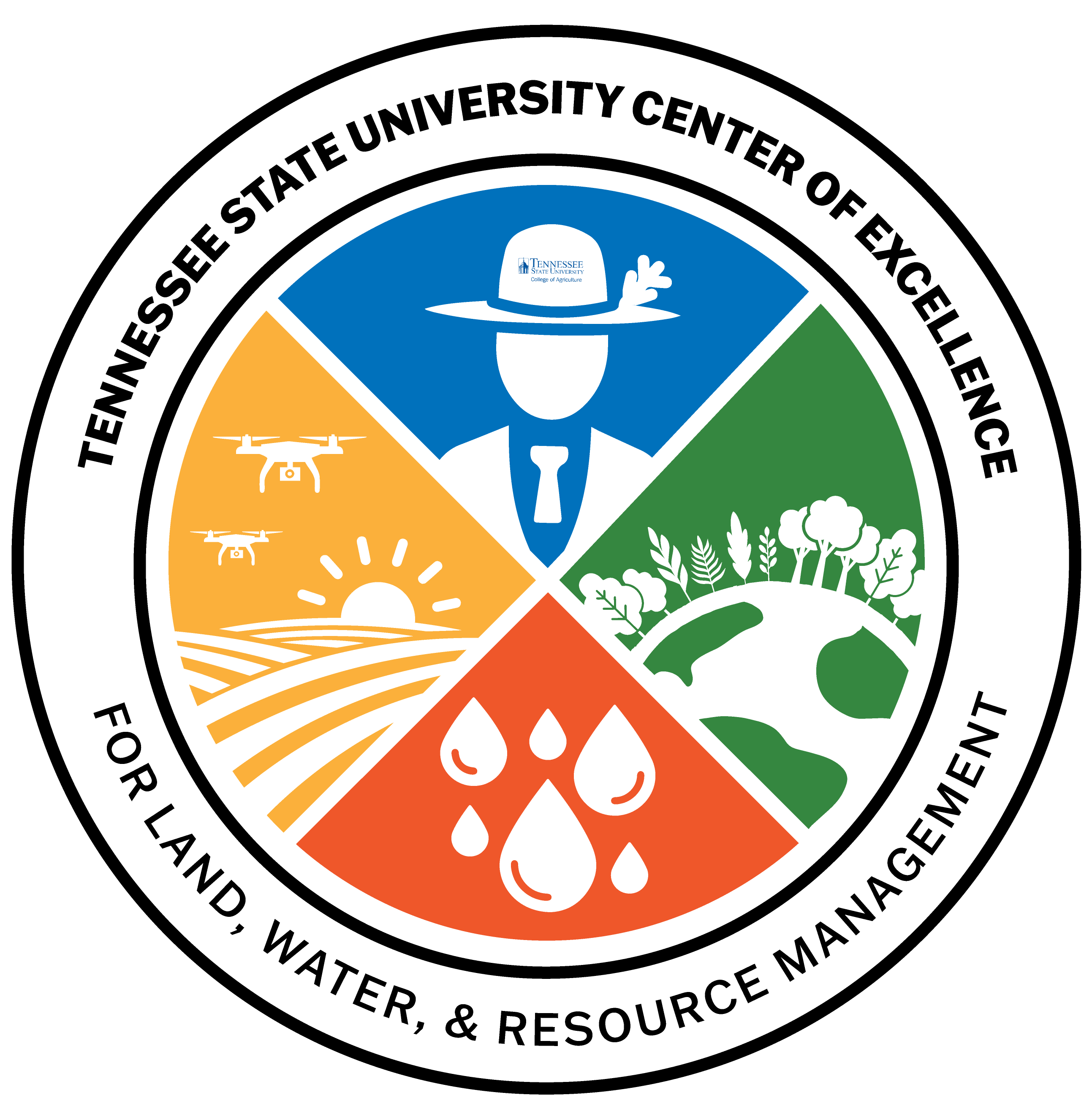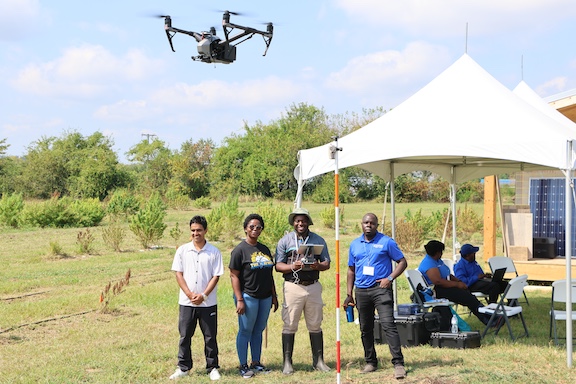- Home >
- College of Agriculture
- > Center of Excellence
Center of Excellence
for Land, Water and Resources Management
Collaborating on Research

|

|
The College of Agriculture at Tennessee State University (TSU) will collaborate with Alabama A&M University, Southern University, Florida A&M University, and Langston University to host The 1 890 Center of Excellence for Land, Water and Resource Management (COE-LWRM). The COE-LWRM will be housed in the Institute for Agricultural and Environmental Research (IAGER) at Tennessee State University. The COE-LWRM’s primary goals and thrust areas are, 1) Natural Resource Management, Conservation and Forest Health, 2) Precision Agriculture and Artificial Intelligence (AI), 3) Ecosystem Health and Water Quality, and 4) Workforce Training and Development. These four multi-disciplinary thurst areas will coordinate and unify participants via scholarly research, teaching , and Extension activities, and provide collaborative opportunities among 1890 institutions to tackle contemporary environmental issues that impact terrestrial and aquatic ecosystems. We will take a One Health approach to evaluate the collective impacts of environmental change, land-use patterns , and water resource availability on ecosystem integrity . The 1890 Center of Excellence in Land, Water and Resources management (COE-LWRM) at Tennessee State University is partnered with following Institutions.
|
|
Announcements Summer Internship Opportunities – COE-LWRMPROGRAM OVERVIEW The RANGE Summer Research Experience is a four-week residential program for motivated high school students interested in agriculture, environmental science, natural resource management, and STEM careers. Participants conduct mentored research, take field excursions, and present their final work at a summer research symposium. PROGRAM SUMMARY The Research and Applied Natural Resource Growth Experience (RANGE) is a 4-week residential summer research program hosted by the Tennessee State University College of Agriculture as part of the Center of Excellence for Land, Water, and Resource Management (COE-LWRM). Supported by the USDA National Institute of Food and Agriculture, Centers of Excellence at 1890 Institutions Program, RANGE provides rising high school juniors and seniors with hands-on training in environmental science, agriculture, natural resource management, and emerging technologies that drive sustainable ecosystems. RANGE students engage in immersive research guided by faculty from TSU. Participants explore research areas including: Students live on campus, conduct supervised research, attend workshops, tour field sites, and present their work at a research symposium. Dates: June 14 – July 10, 2026
APPLICATION INFORMATION Eligibility Requirements Applicants must:
Selection Criteria Applicants will be evaluated on: Program Expectations Selected students must: Applications are now open. Required Application Materials Due February 28, 2026: Download the required forms. Graduate Student Research Opportunities – COE-LWRMThe Center of Excellence for Land, Water, and Resource Management (COE-LWRM) at Tennessee State University is pleased to announce the recruitment of student researchers for the upcoming academic terms. COE-LWRM supports interdisciplinary training and research aligned with its three core thrust areas. Graduate Research Assistantships (GRAs)
Graduate Research Assistants are expected to engage in funded research projects, contribute to publications and presentations, and work closely with faculty mentors. Undergraduate Work-Aid Positions
Undergraduate Work-Aid positions provide hands-on research experience and professional development opportunities while supporting ongoing COE-LWRM projects. For additional details regarding eligibility, expectations, and application procedures, please refer to the COE-LWRM website or contact the Center directly.
Latest Updates |
Our Goals1. Natural Resources Management, Conservation and improve Forest Health 2. Precision Agriculture and use of Artificial Intelligence in Agriculture 3. Ecosystem Health and Water Quality 4. Workforce Training and Development |
What We Are Working On
Natural Resources Management, Conservation and Forest HealthCoordinators/Thurst Area Leaders – Dr. William Sutton and Dr. Yong Wang
|
|
|
|
Precision Agriculture and Artificial Intelligence (AI)Coordinators/Thurst Area Leader: Dr. Chandra Reddy Canola: Lead Scientist - Dr. Jason de Koff Sweet Sorghum: Lead Scientist - Dr. Ahmad Aziz Switch Grass: Lead Scientists - Dr. Dafeng Hui Precision Agriculture: Lead Scientist - Dr. Clement Akumu Crop Nutrition: Lead Scientist - Dr. Dharma Pitchay Crop Adaptation: Lead Scientist - Dr. Mathew Blair Livestock Adaptation: Lead Scientist - Dr. Richard Browning Precision and autonomous agricultural machinery, AI, ML - Dr. Chenchen Kang Aquaculture Adaptation: Lead Scientists - Dr. Malcolm McCallum (Langston) and Dr. Kamal Gosh (Langston) Small Ruminant Genomics and AI - Dr. Zaira Estrada Reyes (PVAMU) Forages/Small Ruminant Parasite Control and AI/ML- Lead Scientists - Dr. Thomas Terril (FVSU) and Dr. Aftab Siddique (FVSU) |
Ecosystem Health and Water QualityCoordinators/Thurst Area Leader: Dr. De’Etra Young and Dr. Zhu Ning Soil Organic Matter, Soil Health, Carbon Sequestration and Soil Science- Lead Scientists - Dr. Jianwei Li, Dr. Sougatha Bardhan and Dr. Resham Thapa Soil Physics, Hydro Geo-Physics, Soil Water Dynamics in Agriculture systems - Lead Scientist - Dr. Felix Ogunmokun Root Systems Biology and interactions between plant roots, soils, and symbiotic soil microbes - Lead Scientists - Dr. Jonatha R Crummings (UMES), and Dr. Xuefeng Li (UMES) Impact of Urban Forests for Air Quality and Greenhouse Gas Reduction – Lead Scientist – Dr. Zhu Ning (Southern University) Prediction, early reporting, and impacts of Harmful Algal Blooms - Lead Scientist - Dr. Tom Byl Environmental Change and its Impacts to Water Quality and Quantity - Lead Scientist - Dr. Yaw Twumasi (Southern University) Geospatial Analysis and Bioremediation: Lead Scientist - Dr. Reginald Archer Soil Contamination: Lead Scientist - Dr. Sudipta Rakshit |
|
Project Manager: Dr. Janith Chandrasoma
Current Postdoctoral/ Research Staff
TSU
Dr. Svitlana Lymanska (Blair/Aziz)
Dr. Xiaoyu Xu (Pokharel)
Dr. Sunil Gurang (Pitchay)
Dr. Judith Oppong (Akumu)
FAMU
Dr. Ken Oduor (Ngatia)
Graduate Students
TSU
Gouse Shaik (PhD/Aziz
Anvesh Sankuratri (PhD/Kang)
Mustapha Olawuni (PhD/Aziz)
Sudip BK (PhD/de Koff)
Rajan Lamsal (PhD/Kang)
Sujata Kattel (PhD/Thapa)
Donna Blankenship (MS/Rakshit)
Jaekedah Christian (PhD/Hui)
Caroline Apraku (PhD/Archer)
Juliana Noi (PhD/Bardhan)
Reka Badu (MS/Blair)
Manoj Burlakoti (PhD/Pokharel)
Dorcas Kayode (MS/Ogunmokun)
Monika Giare (MS/Li)
AAMU
Kern Freesland (MS/Wang)
Andrew Cantell (PhD/Wang)
Thomas Thompson (MS/Wang)
Victor Sennaro (MS/Chen)
FAMU
Aliyah Barnett (MS/Ngatia)
SU
Gabriel Ahoma (PhD/Ning)
Priscillia Loh (PhD/ Ning)
Daniel Aniewu (PhD/Twumasi)
Recheal Armah (PhD/Ning)
LU
K.C. Dipsna (MS/Wulliji)
Undergraduate Students
TSU
Kaya Mitchell (Byl)
Todd Stansberry (Byl)
FAMU
Khalfani Powell (Ngatia)
PVAMU
Eva Dennet (Estrada-Reyes)






